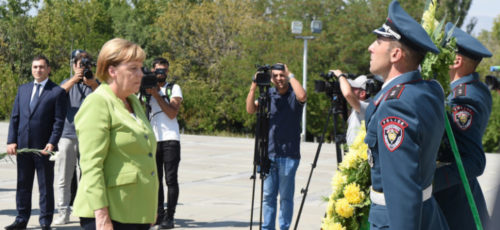BY HARUT SASSOUNIAN, PUBLISHER, CALIFORNIA COURIER · AUGUST 28, 2018
Last week, German Chancellor Angela Merkel visited Georgia, Armenia and Azerbaijan. Media reports indicated that her visit to Armenia and meetings with its leadership were very constructive. Armenian German political, cultural and trade relations are expected to expand. Merkel’s visit resulted in a much needed boost for Armenia’s new democratic government.

German Chancellor Angela Merkel lays a wreath as she pays a visit to the Armenian Genocide memorial complex within the framework of her official visit to Yerevan, Armenia
One of the sensitive issues that both Armenians and the international community were carefully following was Chancellor Merkel’s comments on the Armenian Genocide. The German Parliament (Bundestag) almost unanimously adopted a resolution in 2016 recognizing the Armenian Genocide and declared that “the German Empire bears partial complicity in the events.”
Immediately after the adoption of the Genocide resolution, Turkey withdrew its ambassador from Berlin and threatened to cut off ties with Germany. Relations between Germany and Turkey remain tense for a variety of reasons, but are expected to improve after Turkish President Recep Tayyip Erdogan’s forthcoming visit to Germany in late September.
While in Yerevan, Chancellor Merkel paid a visit to the Armenian Genocide Memorial. She laid a wreath in memory of the 1.5 million Armenian victims and planted a tree at an adjacent park. However, Merkel avoided the use of the term genocide in Yerevan, describing Turkey’s mass killings as “heinous crimes against Armenians” which “cannot and must not be forgotten.” She also stated that she had visited the Genocide Memorial “in the spirit of the Bundestag 2016 resolution.” She clarified that the language used was “a political, not a legal classification.”
Despite Merkel’s goodwill toward Armenia and her very positive statements, I hope that Armenia’s leaders reminded her that the proper term to describe the planned extermination of 1.5 million Armenians is “Genocide,” not simply “heinous crimes.”
Armenia’s leaders could have informed Chancellor Merkel of a recent report by Ben Knight of Germany’s Deutsche Welle (DW) about the weapons provided by the German Reich to the Ottoman Turkish forces to carry out the Armenian Genocide.
According to DW, “Mauser, Germany’s main manufacturer of small arms in both world wars, supplied the Ottoman Empire with millions of rifles and handguns, which were used in the genocide with the active support of German officers.” Furthermore, quoting from a report by “Global Net—Stop the Arms Trade,” DW stated that “the Turkish army was also equipped with hundreds of cannons produced by the Essen-based company Krupp, which were used in Turkey’s assault on Armenian resistance fighters holding out on the Musa Dagh Mountain in 1915.”
The author of the Global Net report, Wolfgang Landgraeber, wrote that “Mauser really had a rifle monopoly for the Ottoman Empire.”
DW revealed that “many of the firsthand German accounts in the report come from letters by Major Graf Eberhard Wolffskehl, who was stationed in the southeastern Turkish city of Urfa in October 1915. Urfa was home to a substantial population of Armenians, who barricaded themselves inside houses against the Turkish infantry. Wolffskehl was serving as chief of staff to Fakhri Pasha, deputy commander of the Ottoman 4th Army, which had been called in as reinforcement.”
In a letter to his wife, Major Wolffskehl shamelessly bragged about the killing of Armenians by German troops in Urfa: “They [the Armenians] had occupied the houses south of the church in numbers. When our artillery fire struck the houses and killed many people inside, the others tried to retreat into the church itself. But … they had to go around the church across the open church courtyard. Our infantry had already reached the houses to the left of the courtyard and shot down the people fleeing across the church courtyard in piles. All in all the infantry, which I used in the main attack … acquitted itself very well and advanced very dashingly.”
Landgraeber also reported that “while German companies provided the guns, and German soldiers the expert advice on how to use them, German officers also laid the ideological foundations” for the Armenian Genocide.
German Navy Attache Hans Humann, a member of the German-Turkish officer corps and close friend of the Ottoman Empire’s war minister, Enver Pasha, wrote: “The Armenians—because of their conspiracy with the Russians — will be more or less exterminated. That is hard, but useful.”
Furthermore, Landgraeber wrote in his report about “the Prussian major general Colmar Freiherr von der Goltz, a key figure who became a vital military adviser to the Ottoman court in 1883 and saw himself as a lobbyist for the German arms industry and supported both Mauser and Krupp in their efforts to secure Turkish commissions. (He once boasted in his diary, ‘I can claim that without me the rearmament of the [Turkish] army with German models would not have happened.’)” Goltz “helped persuade the Sultan to try and end the Armenian question once and for all!”
The above quotations support the admission by Bundestag’s 2016 resolution that Germany was complicit in the Armenian Genocide and German President Joachim Gauck’s acknowledgment in 2015 about Germany’s “co-responsibility” for the Armenian Genocide. Being well aware of these facts, Chancellor Merkel should have called the Armenian Genocide by its proper name: Genocide.